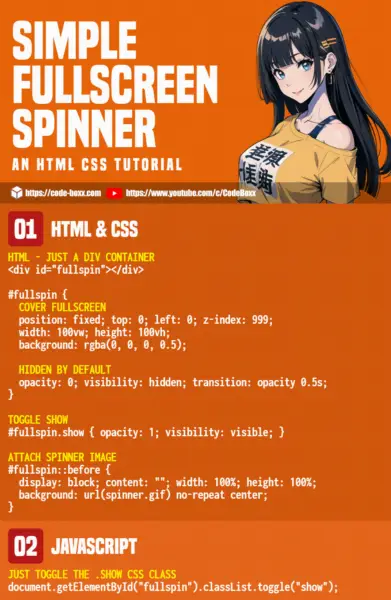Welcome to a tutorial on how to create a fullscreen loading spinner. Want to show a “now loading” screen? There’s no need to load an entire library or framework, here’s how to create one yourself. Read on!
TABLE OF CONTENTS
DOWNLOAD & DEMO
Here is the download link to the example code, so you don’t have to copy-paste everything.
EXAMPLE CODE DOWNLOAD
Click here to download | Example on CodePen
Just click on “download zip” or do a git clone. I have released it under the MIT license, so feel free to build on top of it or use it in your own project.
SORRY FOR THE ADS...
But someone has to pay the bills, and sponsors are paying for it. I insist on not turning Code Boxx into a "paid scripts" business, and I don't "block people with Adblock". Every little bit of support helps.
Buy Me A Coffee Code Boxx eBooks
FULLSCREEN SPINNER DEMO
FULLSCREEN LOADING SPINNER
All right, let us now get into building a simple full-screen spinner – No third-party frameworks required.
TUTORIAL VIDEO
PART 1) THE HTML
<!-- (A) LOAD CSS + JS -->
<link rel="stylesheet" href="spinner.css">
<script defer src="spinner.js"></script>
<!-- (B) DEMO -->
<button onclick="
fullspin.show();
setTimeout(fullspin.hide, 3000);">
Show Spinner For 3 Seconds
</button>For you guys who just want to use this as a “plugin”:
- Load the CSS and Javascript.
- Call
fullspin.show()to show the spinner, andfullspin.hide()to hide it.
PART 2) THE JAVASCRIPT
var fullspin = {
// (A) INIT
wrap : null,
init : () => {
fullspin.wrap = document.createElement("div");
fullspin.wrap.id = "fullspin";
document.body.appendChild(fullspin.wrap);
},
// (B) SHOW & HIDE
show : () => fullspin.wrap.classList.add("show"),
hide : () => fullspin.wrap.classList.remove("show")
};
window.addEventListener("load", fullspin.init);What happens in the Javascript:
- On window load, we call
fullspin.init(). All it does is append a<div id="fullspin">wrapper to the end of the page. - How we toggle the fullscreen spinner – Toggle a
showCSS class on the<div>wrapper.
PART 3) THE CSS
/* (A) WRAPPER */
#fullspin {
/* (A1) COVER FULLSCREEN */
position: fixed; top: 0; left: 0; z-index: 999;
width: 100vw; height: 100vh;
background: rgba(0, 0, 0, 0.5);
/* (A2) HIDDEN BY DEFAULT */
opacity: 0; visibility: hidden;
/* (A3) FADE ANIMATION */
transition: opacity 0.5s;
}
/* (B) SHOW WRAPPER */
#fullspin.show {
opacity: 1; visibility: visible;
}
/* (C) SPINNER */
#fullspin::before {
display: block; content: "";
width: 100%; height: 100%;
background: url(spinner.gif) no-repeat center;
}Remember that the Javascript only added a <div id="fullspin"> to the page? Here are the key mechanics.
- (A1) Set the wrapper to cover the entire page with a fixed position and 100% viewport width/height.
- (C) Use the
::beforepseudo-class of the wrapper to insert the spinner image. - (A2 & B) Hide the spinner by default. Display it only when we add a
showCSS class on the wrapper.
EXTRAS
That’s all for the tutorial, and here is a small section on some extras and links that may be useful to you.
SHOW SPINNER WHILE LOADING
fullspin.show(); // show spinner
fetch("URL")
.then(res => res.text())
.then(txt => console.log(txt)) // do something with fetch result
.catch(err => console.error(err))
.finally(() => fullspin.hide); // hide spinnerPlanning to use the spinner while AJAX is working in the background? Simply show it when the loading starts, and hide it when it is done.
CUSTOMIZE YOUR SPINNER
Feel free to generate and customize your loading spinner image, there are plenty of online generators that can be used for free:
INFOGRAPHIC CHEATSHEET

LINKS & REFERENCES
- Loading Spinner On Dropdown Box – Code Boxx
- Show Loading Spinner Until Page Loads – Code Boxx
THE END
Thank you for reading, and we have come to the end of this short tutorial. I hope that it has helped you to create a better project, and if you have anything to add to this guide, please feel free to comment below. Good luck and happy coding!

Well… simply don’t do anything… no errors, but the loader not show
Simplified and updated – Watch the tutorial video. The demo on this page is also verified to be working on Chrome, Firefox, Edge, Opera, Mobile Chrome, Mobile Firefox. Any modern browser for the matter. If it is “not working”, you must be using some really ancient browser… Or your own customizations/plugins messed it up.
sorry didnt work
https://code-boxx.com/faq/#notwork
Awesome!